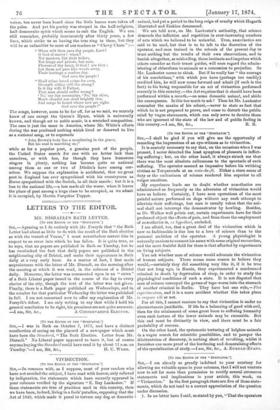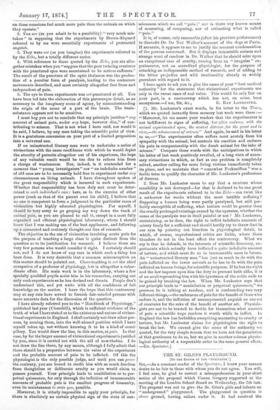[TO THE EDITOR OF THE "SPECTATOR"]
am already so greatly indebted to your courtesy for allowing me valuable space in your columns, that I will not venture now to ask for more than permission to rectify several erroneous statements and implications in your article, this week, on "Vivisection." In the first paragraph there are five of these state- ments, which do not tend to a correct appreciation of the question under discussion.
1. In no letter have I said, as stated by you, "That the operators on these occasions feel much more pain than the animals on which they operate."
2. You are (as you admit to be a possibility) "very much mis- taken" in supposing that the experiments by Brown-Sdquard referred to by me were essentially experiments of protracted anguish.
S. They were not (as you imagine) the experiments referred to by the Echo, but a totally different series.
4. With reference to those quoted by the Echo, you are alto- gether mistaken when you "suppose that the poor twisting creatures with the punctured eyes were ascertained to be serious sufferers." The result of the puncture of the optic thalamus was the produc- tion of a peculiar form of paralysis, leading to the corkscrew movements described, and most certainly altogether free from and independent of pain.
5. The eye in these experiments was not punctured at all. You have been led into the elaboration of this picturesque detail, as an accessory to the imaginary scene of agony, by misunderstanding the origin of the name of a part of the brain. The brain- substance appears not to be sensitive.
I must beg you not to conclude that my principle justifies " any amount of animal pain, under any hope, however dim," of con- tributing to science. That is not what I have said, nor would it be said, I believe, by any man taking the scientific point of view. it is a gratuitous conversion on your part of a limited proposition into a universal one.
If an uninstructed literary man were to undertake a series of vivisections with the same confidence with which be would depict the atrecity of pursuits altogether out of his experience, the hope -of any valuable result would be too dim to relieve him from a charge of wantonness. Nor, indeed, is it contended for a moment that "young investigators" nor "an indefinite number" 'of old ones are to be necessarily held free to experiment under any circumstances on living animals. I have throughout spoken of the great responsibility which is incurred in such experiments. Whether that responsibility has been duly met must be deter- mined in each individual's case : here, as in the exercise of other power (such as that of the parent over his child), I believe that no one is competent to form a judgment in the particular cases of -vivisection -but highly educated physiologists. For myself, I should be very sorry to go groping my way down the track of -animal pain, as you are pleased to call it, except in a most fully organised and efficient physiological laboratory, where I should know that I was making use of the best appliances, and following up a connected and maturely thought-out line of research.
The objection to the use of vivisection involving acute pain for the purpose of teaching a large class is quite distinct from the 'question as to its justification for research. I believe there are -very few persons who would consider it right. I certainly should not, and I do not know of any case in which such a thing has been done. It is very desirable that a common misconception on this matter should be pointed out. Class-teaching is not the chief -occupation of a professor of physiology, but is altogether a subor- dinate affair. His main work is in the laboratory, where a few specially qualified pupils assist him in his researches, carrying out only such experiments as he has devised and directs. People don't -understand this, and yet write with all the confidence of full 'knowledge on the matter. I have the hope that this controversy - may at any rate have served to furnish fair-minded persons with more accurate data for the discussion of the question.
I have already referred you to the "Handbook of Physiology," published last year (Churchill), which is sufficient evidence of the -truth of what I have stated as to the existence and nature of vivisec- tional experiments in England. I shall certainly not draw other per- sons, by naming them, into the well-abused position which I have myself taken up, not without knowing it to be a kind of moral pillory. You would draw the line, in this matter, at pain. In that case, by far the larger amount of vivisectional experiment is justified by you, since it is carried out with the aid of anontheties. I do not draw the line there, by any means, although I fully admit that -there should be a proportion between the value of the experiment and the probable amount of pain to be inflicted. Of this the physiologist is the only possible judge, and until you can prove the contrary, you are bound to credit him with as much freedom from thoughtless or deliberate cruelty as you would claim to possess yourself. Your principle leads to annihilation or to per- -petual quiescence, for only through the infliction of immeasurable -amounts of probable pain is the smallest progress of humanity,
• even its maintenance in stain quo, possible.
Moreover, it is utterly impossible to apply your principle, for there is absolutely no certain physical sign of the state of con-
sciousness which we call "pain ;" nor is there any known means of measuring, of comparing, nor of estimating what is called "pain."
It is, of course, only reasonable (after his previous performance) to discredit Dr. De Nod Walker's account of the dogs at Pavia. If accurate, it appears to me to justify the severest condemnation of the persons concerned. But it displays lamentable animus and strange want of candour in Dr. Walker that he should seize upon an exceptional case of cruelty, coming from an " irregular " ex- perimenter, not an accredited physiologist, for the purpose of attacking an indispensable method of research, and of adding to the bitter prejudice and wild irratienality already so widely prevalent with regard to it.
I have again to ask you to give the name of your "best medical authority" for the statement that vivisectional experiments are only in the rarest cases of real value. This would be only fair on your part, in a controversy which has not, on mine, been [1. Mr. Lankester's exact words, in his letter to the Times, which we quoted inexactly from memory last week were these :— " Moreover, let me assure your readers that the experimenter is not indifferent to signs of suffering, but often endures, with the animal experimented upon, the acutest distress for the great end in view,—the advancement of science." And again, he said in his letter to us,—" The experimenter often suffers most acutely from his sympathy with the animal, but controls his emotion and endures his pain in companionship with the dumb animal for the itaka of science." Compare these words with the anticipations in which his letter of last week positively revelled, of a long vista of neces- sary vivisections in which, as fast as one problem is completely solved, another calling for more living victims immediately takes its place, and we maintain that "somewhat Pecksniffian " was a feeble term to qualify the character of Mr. LInkester's professions of distress.
2. Does Mr. Lankester mean to say that a creature whose sensibility is not destroyed—for that is declared to be one great result of the experiments referred to in the Echo —can twist like a corkscrew for weeks without the most terrible suffering? Supposing a human being were partly paralysed, but still per- fectly susceptible of suffering, what torture could be greater than the cruelly prolonged twistings caused by the operator, whether the cause of the paralysis was in itself painful or not ? Mr. Lankester, maintaining, as he does, the right to inflict indefinite amounts of misery freely for a sufficient end should hardly try to throw dust in our eyes by pointing out blunders in physiological detail, to which, of course, unprofessional critics are liable, where these blunders do not in the least affect the controversy. What we say is that he defends, in the interests of scientific discovery, ex- periments which actually have inflicted a quite indefinite amount of torture, and which must do so in innumerable cases in future. An "uninstructed literary man " has just as much to do with the pain inflicted on the lower animals as he has to do with the pain inflicted on human beings, for scientific purposes. If he has the right and the law imposes upon him the duty to prevent both alike, it is of no avail reproaching him with his ignorance of the noble ends to be gained by breaking the law. When Mr. Lankester says that our principle leads to "annihilation or perpetual quiescence," we presume he is talking at random, and is confounding two very different things,—the endurance of pain for the benefit of those who endure it, and the infliction of uncompensated anguish on one set of creatures for the sake of the benefit of another set. Physiolo- gists are not to be trusted to decide for themselves what amount of pain a scientific hope renders it worth while to inflict. In England the law has forbidden everything amounting to cruelty or torture, but Mr. Lankester claims for physiologists the right to break the law. We cannot give the name of the authority we quoted, for the very simple reason that we have not the permission of that gentleman to do so, but we give in another column physio- logical authority of a respectable order to the same general effect. —ED. Spectator.]



































 Previous page
Previous page